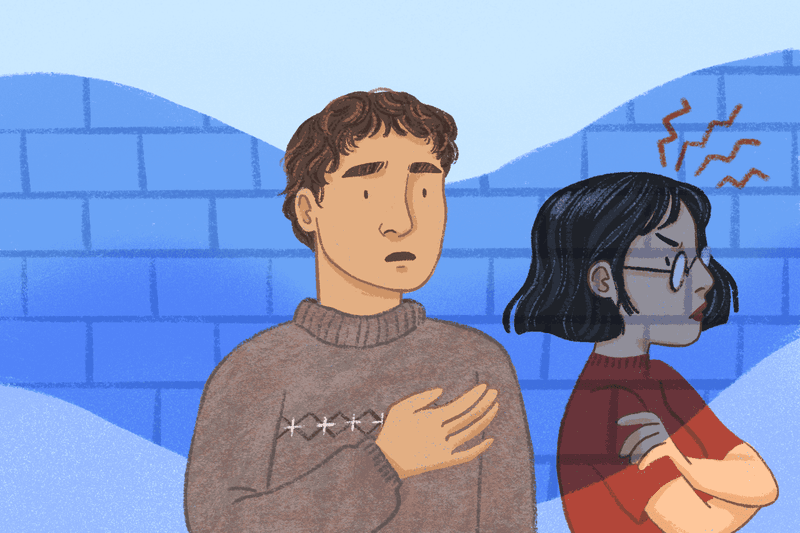16 Emotional “Red Flags” People Still Ignore Every Day
In our daily interactions, subtle emotional cues can signal deeper issues that we often overlook. These “red flags,” though seemingly minor, can have lasting emotional impacts if ignored. It’s crucial to recognize and address these signs to foster healthier relationships and emotional well-being.
Here, we explore 16 emotional red flags that people still ignore every day, shedding light on behaviors that shouldn’t be normalized.
1. You explain your feelings more than they’re heard

Have you ever found yourself explaining the same feeling for the umpteenth time, yet it still flies over their head? It’s an all-too-common scenario where your words seem to drift into oblivion. This emotional red flag signifies a lack of empathy and genuine interest. When communication feels like a solo endeavor, it may indicate a deeper disconnect.
In relationships, being heard is as vital as expressing oneself. A one-sided communication pattern can lead to frustration and emotional fatigue. It’s essential to assess whether your voice truly matters in the relationship. Ignoring this red flag might result in feeling undervalued and emotionally isolated, which can erode the foundation of trust and intimacy.
2. You feel exhausted after every conversation

Conversations should energize, not exhaust. However, some interactions leave you feeling like you’ve run a mental marathon. This emotional red flag manifests when every dialogue feels like an uphill battle. It happens when conversations are more about defending yourself or placating the other person’s emotions than genuine exchange.
If discussions consistently leave you weary, it’s time to evaluate the emotional toll your interactions take on you. Such exhaustion can signal that boundaries are being overstepped or unmet needs persist. Recognizing this red flag can help restore balance in relationships, ensuring conversations become nourishing rather than draining experiences, ultimately fostering psychological well-being.
3. Apologies always come with a “but”

“I’m sorry, but…”—an apology that negates itself. This red flag is as subtle as it is significant, revealing an unwillingness to fully own one’s mistakes. Genuine apologies require vulnerability and acknowledgment of hurt caused. The insertion of a “but” dilutes sincerity, often shifting blame or justifying actions. When apologies consistently come with conditions, it suggests a pattern of avoidance and defensive behavior.
Over time, these conditional apologies erode trust, leaving emotional wounds unhealed. Recognizing this pattern is crucial for addressing accountability in relationships. True contrition involves change and understanding, without caveats or backtracking. It’s about making amends, not excuses.
4. You dread asking for help

The reluctance to seek assistance is more telling than it appears. This red flag often masks a fear of burdening others or facing judgment. When asking for help feels daunting, it may indicate a lack of support within the relationship. It’s crucial to examine why reaching out induces anxiety. Healthy relationships thrive on mutual support and open communication.
When you feel you can’t ask for help without repercussions, it creates an imbalance and fosters isolation. Recognizing this reluctance is a step towards fostering supportive dynamics where needs are respected and assistance is freely offered and accepted. It’s about creating a space where vulnerability is met with compassion.
5. Their mood controls yours

Have you ever noticed your emotional state being dictated by someone else’s mood? This red flag indicates a lack of emotional boundaries, where another person’s emotions heavily influence your own. It’s a common occurrence in close relationships, yet deeply unhealthy. Allowing someone else’s mood to control yours can lead to emotional dependency and neglect of self-care.
Recognizing this pattern involves reclaiming your emotional autonomy. Establishing clear boundaries is essential to maintain a balanced emotional state. By acknowledging this red flag, you can strive for a relationship where moods complement rather than control, promoting individual emotional resilience and healthy connection.
6. You keep secrets to protect someone else’s image

Guarding secrets for the sake of someone else’s image is an insidious emotional red flag. It reflects a dynamic where appearances matter more than honesty. This behavior often stems from fear of conflict or repercussions. However, it leads to emotional dishonesty and internal conflict. The weight of maintaining these secrets can become burdensome, affecting your integrity and self-worth.
Recognizing this flag prompts reflection on the authenticity and transparency in your relationships. It’s essential to foster environments where honesty prevails over image. Addressing this pattern can liberate you from the constraints of secrecy, paving the way for genuine connections where truth reigns over facade.
7. Their compliments often have a hidden jab

Receiving a compliment that feels more like a covert criticism? This emotional red flag is a subtle form of manipulation, often camouflaged as humor or light-heartedness. These backhanded compliments can erode self-esteem over time. It’s essential to recognize when praise comes with a sting and question the intent behind their words.
Consistently encountering such remarks might indicate underlying resentment or insecurity in the other person. Addressing this behavior involves confronting the disguised negativity and seeking respect and sincerity in interactions. By acknowledging this red flag, you can cultivate relationships that nurture genuine appreciation and mutual respect, void of veiled criticisms.
8. You feel guilty for setting boundaries

Setting boundaries is a cornerstone of healthy relationships, yet feeling guilty for doing so is a prevalent red flag. It often arises from fear of rejection or guilt for prioritizing oneself. Boundaries are essential for self-preservation and mutual respect, yet they can be misconstrued as selfishness.
Recognizing this guilt is vital for fostering self-respect and understanding in relationships. It’s important to remember that boundaries are acts of love, not barriers. They define personal limits and preserve emotional health. By addressing this guilt, you can create spaces where boundaries are respected and valued, ensuring relationships are balanced and mutually fulfilling.
9. You stop talking to avoid starting something

Silence as a means to avoid conflict? This red flag highlights a dynamic where fear of confrontation stifles expression. It reveals environments where speaking up feels futile or dangerous. Over time, this suppression leads to resentment and emotional withdrawal. When silence becomes a protective mechanism, it’s crucial to reassess the openness and safety of your communication space.
Healthy relationships thrive on open dialogue and mutual understanding. Recognizing this pattern is the first step in restoring your voice and fostering environments where diverse perspectives are welcomed. It’s about breaking the silence and nurturing a culture of open, respectful discourse.
10. You’re blamed for how they react

Ever feel like you’re at fault for someone else’s emotional outburst? This red flag uncovers a manipulative tactic that deflects responsibility. When you are consistently blamed for their reactions, it indicates a refusal to own their emotions and behavior. This dynamic breeds guilt and self-doubt. Recognizing this pattern is critical for understanding accountability in relationships.
It’s important to differentiate between triggering emotions and being responsible for them. By acknowledging this red flag, you can advocate for fairness and mutual accountability. Healthy relationships encourage personal responsibility, where emotions are navigated with empathy and understanding, not blame.
11. Emotional closeness always feels out of reach

Feeling emotionally distant despite physical proximity? This red flag speaks to a lack of emotional intimacy. It occurs when attempts to connect are met with indifference or barriers. Emotional closeness requires vulnerability, trust, and mutual effort. When these are absent, relationships feel hollow and unfulfilling. Recognizing this flag involves evaluating the emotional availability and responsiveness of your partner.
It’s about striving for connections that transcend superficial interactions. By addressing this pattern, you can work towards nurturing deeper bonds characterized by genuine understanding and shared emotional experiences, ensuring relationships are rich and emotionally satisfying.
12. You downplay your own needs to keep peace

Suppressing your own needs for the sake of harmony? This red flag reveals a pattern of self-sacrifice that compromises personal well-being. It often arises from fears of conflict or disruption. However, consistently neglecting your needs leads to dissatisfaction and resentment. It’s crucial to recognize the importance of voicing your needs and ensuring they’re met.
Healthy relationships embrace compromise while respecting individual needs and desires. Acknowledging this red flag involves valuing your own needs as much as others’. It’s about creating balanced dynamics where peace doesn’t come at the expense of self. By addressing this, you can foster fulfilling, equitable relationships.
13. You constantly justify their behavior to others

Frequently making excuses for someone else’s behavior? This red flag is a defense mechanism that masks deeper issues. It often stems from denial or fear of the truth. Justifying their actions to others indicates an imbalance in the relationship, where behavior that should be questioned is instead rationalized. Recognizing this pattern is crucial for acknowledging reality and fostering authenticity.
It involves questioning why you feel compelled to defend behavior that raises concern. By addressing this red flag, you can seek honesty and transparency in relationships, ensuring actions align with values and integrity, ultimately promoting healthier, more genuine connections.
14. You second-guess your own instincts

Doubting your gut feelings? This red flag highlights a disconnect from your intuition, often caused by external influences that undermine self-trust. Instincts are valuable guides in navigating relationships and life. When you second-guess them, it suggests a lack of confidence or manipulation by others. Recognizing this pattern involves reconnecting with your inner voice and trusting its wisdom.
It’s about distinguishing between genuine intuition and external pressures. By acknowledging this red flag, you can reclaim your confidence, making decisions that reflect your true self and fostering relationships that respect and honor your instincts, ultimately enhancing personal empowerment.
15. You celebrate tiny moments of basic decency

Finding joy in minimal gestures of kindness? This red flag indicates lowered expectations within a relationship. When basic decency feels like a luxury, it’s a sign that emotional needs aren’t being met. Healthy relationships thrive on mutual respect and kindness as the norm, not the exception. Recognizing this flag involves reassessing the standards and dynamics of your relationship.
It’s about striving for partnerships where decency and respect are consistent, not occasional. By addressing this pattern, you can advocate for a relationship that values kindness as a foundational element, ensuring interactions are characterized by genuine care and appreciation, not scarcity.
16. You feel more alone when you’re with them

Ever felt a profound loneliness in someone’s presence? This red flag highlights emotional disconnection, where physical proximity doesn’t translate to companionship. It’s an experience that reveals unmet emotional needs and a lack of meaningful connection. Recognizing this flag involves evaluating the emotional quality of your interactions.
It’s about seeking relationships that fulfill rather than deplete, where presence equates to support and understanding. By addressing this pattern, you can work towards cultivating connections that offer genuine companionship and emotional nourishment, ensuring that your relationships bring comfort and joy rather than solitude in company.







